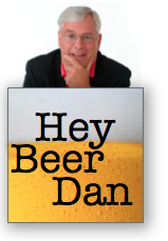Standing out means standing... for something
Nowadays, craft beer is no longer posting easy, heady growth numbers. Many large craft brands are declining. And that means real competition has arrived. Say goodbye to the days of "we're all in this crazy craft beer business together" bonhomie. To grow now, a craft brand needs to take business away from another craft brand. That calls for marketing; for deciding on what basis you'll sell your brand as better and distinctive versus the others. And here's where craft brewers, many new to marketing, have run into difficulty.
A few years back, when Budweiser launched its "Made the Hard Way" ads on the Super Bowl making fun of many craft beer selling points. Pumpkin-peach flavor, "sipping," and the like. In response, a group of craft beers funded a spoof-ad response. Take a look...
Ballast Point was just like lots of craft brewers
Like many craft brewers, Ballast Point enjoyed a good deal of early success largely on the strength of brewing very good beers. The San Diego-based brand grew rapidly, ultimately attracting the interest of Constellation Brands (Corona, Modelo, etc.) who purchased the small craft brewer for a staggering $1 billion price. Timing is everything. Very little time passed until Ballast Point was suffering from the proliferation of craft brands. The easy money was no longer easy. The brand stalled, and then began declining.
Choosing a selling strategy means choosing not to pursue many others. To succeed, Ballast Point needed marketing to establish a distinctive premise, one to set them apart from other craft brands. One that would appeal to a great many craft-beer shoppers. Said another way, Ballast Point needed to be, not just a craft beer brand, but a craft beer brand that stood for something.
Marketing = selling
In a classic marketing move no doubt driven by Constellation's marketing team, Ballast Point placed their bet on offering an exceptional flavor experience. "What's distinctive about that?" you ask. The distinctiveness comes from the explicit statement--the "reason why" in marketing speak--supplied to support the implicit "We taste best" claim. And while craft brewers often turn their noses up at mainstream marketing, this "rated best" claim is one that has worked in countless competitive categories...
Will this "close to perfect" distinctiveness claim based on Beer Advocate ratings bring every craft-beer drinker to Ballast Point?
Wrong question.
Will it make Ballast Point stand out in a crowded marketplace and, as a result, win more than its share of buying decisions?
Bet on it.



 RSS Feed
RSS Feed
